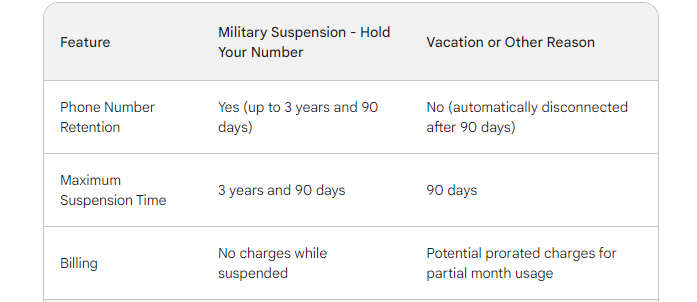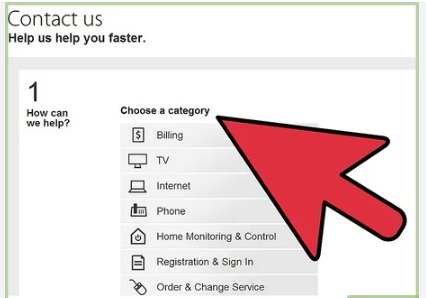The call to serve brings immense pride, but it can also disrupt daily routines. For Verizon customers deploying overseas, managing phone service becomes an additional concern. This exclusive article delves into Verizon’s service suspension options for military personnel, equipping you with the knowledge to make informed decisions regarding your mobile service during deployment.
Understanding Verizon’s Service Suspension Options
Verizon offers flexible service suspension options specifically designed for military deployments:
- Military Suspension – Hold Your Number:This option allows you to temporarily suspend service on your line while deployed, but retain your phone number. This is particularly beneficial if you plan to resume using your Verizon service after returning from deployment.
- Vacation or Other Reason:This general suspension option can also be used for deployments, but it comes with some key differences compared to the Military Suspension option. Here’s a breakdown of the key points:

Determining the Right Option for You
The ideal Verizon suspension option for your deployment depends on several factors:
- Deployment Length:If your deployment exceeds 90 days, the Military Suspension option is the clear choice to retain your phone number.
- Desire to Maintain Your Phone Number:If you plan to use your Verizon service upon returning, choose the Military Suspension option to ensure your phone number isn’t reassigned.
- Budget Considerations:While both options waive monthly service charges during suspension, the Vacation or Other Reason suspension might incur prorated charges if you suspend mid-billing cycle.
Qualifying for Military Suspension
To qualify for the Military Suspension – Hold Your Number option, you’ll need to meet the following criteria:
- Active Duty Military Service:You must be on active duty with the U.S. Armed Forces.
- Deployment Orders:Provide Verizon with a copy of your deployment orders exceeding 90 days.
- Servicemembers Civil Relief Act (SCRA) Eligibility:While not explicitly required, deployments typically qualify under the Servicemembers Civil Relief Act (SCRA), which grants certain protections to military personnel regarding phone contracts.
Initiating a Military Suspension
Here’s how to initiate a Military Suspension with Verizon:
- Online:Sign in to your My Verizon account and navigate to the “Account” section. Locate the “Suspend or reconnect” option and choose “Military Deployment” as the reason for suspension. Follow the on-screen instructions to complete the process.
- Phone:Contact Verizon customer service at 1-800-VERIZON (1-800-837-4966). Explain your intention to suspend service due to military deployment and provide the required documentation (deployment orders) to the customer service representative.
- Verizon Retail Store:Visit a Verizon retail store and speak with a representative about initiating a Military Suspension for your phone line.
Important Considerations for Military Suspension
Here are some crucial points to keep in mind when suspending your Verizon service with the Military Suspension option:
- Unlocking Your Device:Verizon will typically unlock your phone upon initiating a Military Suspension, allowing you to use it with local SIM cards while deployed.
- Data Usage:Data usage while deployed on a local SIM card will incur additional charges not covered by your Verizon plan.
- Incoming Calls:While your phone number is suspended, incoming calls will not be received. Consider setting up call forwarding to a voicemail box or another phone number before deployment.
- Reactivating Service:Upon returning from deployment, contact Verizon to reactivate your service. The process is typically straightforward and involves verifying your identity and deployment completion.

Alternative Options for Military Personnel
While the Military Suspension option is a valuable benefit for Verizon customers, consider these alternative strategies for managing phone service during deployment:
- International Calling Plans:If you anticipate making or receiving international calls while deployed, consider enrolling in an international calling plan with Verizon to potentially reduce per-minute costs.
- Local SIM Cards:Purchasing a local SIM card upon arrival at your deployment location can be a cost-effective option for making and receiving calls within the country. However, ensure your phone is unlocked to use a local SIM card.
Communication Apps: Utilizing communication apps like WhatsApp, Viber, or Skype over Wi-Fi can be a cost- effective way to stay connected with loved ones back home. These apps typically offer free or low-cost calling and messaging features when connected to a Wi-Fi network. However, be mindful of data usage if using these apps over cellular data while deployed.
Additional Considerations for Military Personnel
- SCRA Protections:The Servicemembers Civil Relief Act (SCRA) offers benefits for deployed service members regarding phone contracts. Familiarize yourself with your rights under SCRA to ensure you’re receiving the most favorable terms from your mobile service provider.
- Deployment Communication:Military bases often offer communication resources for deployed personnel, including internet cafes or discounted calling plans. Explore the communication options available at your deployment location.
The Future of Military Communication
The landscape of military communication is constantly evolving. Here’s a glimpse into what the future might hold:
- Advancements in Technology:Emerging technologies like satellite-based communication systems could potentially provide more reliable and affordable phone and internet access in remote deployment locations.
- Focus on Cybersecurity:As reliance on digital communication increases, ensuring secure communication channels for military personnel will remain a top priority.
- Integration with Military Technology:Integration of communication apps and services with existing military technologies could enhance operational efficiency and troop communication during deployments.
Conclusion: Staying Connected While Serving
Deployment can be a challenging yet rewarding experience. Understanding Verizon’s suspension options, exploring alternative communication strategies, and familiarizing yourself with SCRA protections empower you to make informed decisions regarding your phone service. By planning ahead and utilizing the resources available, you can maintain communication lifelines with loved ones back home while you focus on serving your country. Remember, a little preparation can go a long way in ensuring a smoother communication experience during your deployment.